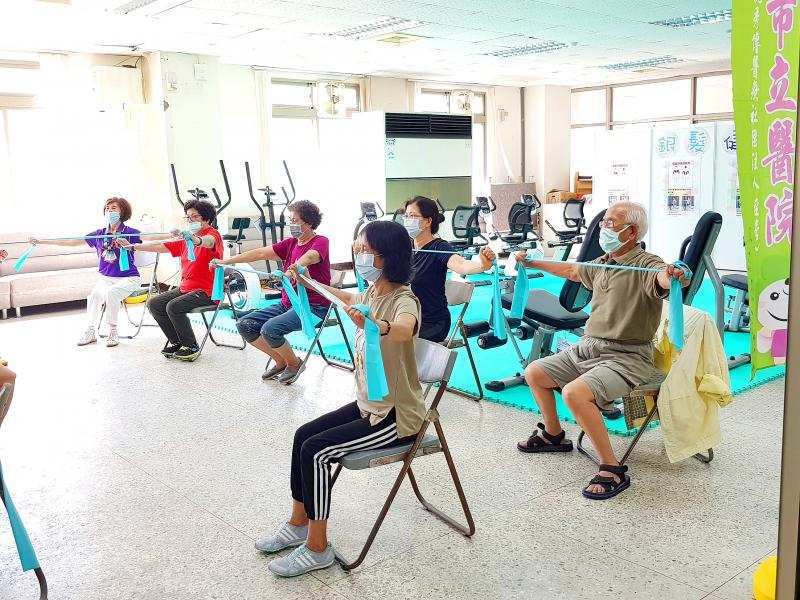Tainan’s first fitness club for seniors had its unveiling ceremony on April 30 at the Daen Borough Activity Center in South District. Seniors can try the facilities out free of charge until the end of June.
The seniors’ fitness club is a joint creation of Tainan City Government and Tainan Municipal Hospital, with a subsidy from the Ministry of Health and Welfare. The club is mostly focused on muscular strength training, whereas the majority of older people who exercise on their own do mostly light or aerobic exercises. The club’s target community is seniors aged 50 and above. It is equipped with 11 exercise machines for cardiopulmonary (aerobic), arm, leg and core (abdominal) training. A qualified coach certified to medium level is on hand to offer guidance, and during certain periods the coach will work with Tainan Municipal Hospital personnel specialized in nursing, rehabilitation and nutrition. Through initial assessment by specialized instructors, the club can tailor exercise programs to the needs of older individuals, including guided strength and stamina training, supplemented by enjoyable group exercise classes.
The unveiling ceremony was presided over by Tainan Mayor Huang Wei-che, Ministry of Health and Welfare Department of Long-Term Care Deputy Director-General Chou Tao-chun and Tainan City Government Social Affairs Bureau Director-General Chen jung-chih.

Photo courtesy of the Tainan City Government Social Affairs Bureau 照片:台南市社會局提供
Huang said that Taiwan is set to become a super-aged society in the year 2025, when one person in five will be aged 65 or older. He said that everyone grows old, but not everyone will have a long and healthy life, and no one wants to become a burden on the next generation. Huang said he hoped that by promoting senior citizens’ fitness activities, the club can help older people get into the exercise habit early on, so that they can stay healthy, keep their faculties and enjoy a better quality of life and a better living environment.
Chou hopes that the wide deployment of a friendly exercise environment and specialist personnel through the seniors’ fitness club project will make older people more willing to exercise and improve their physical fitness, thus cultivating a regular exercise routine among seniors, delaying the decline in their faculties and reducing their dependence on long-term care resources.
Tainan Municipal Hospital Superintendent Tsai Liang-miin said that countries around the world are facing the challenge of aging populations. He said that Tainan Municipal Hospital is working to support the health of Tainan residents from the aspects of healthcare, society and housing, and that as long as older people go on exercising and rehabilitating, they can maintain their muscular strength, delay the decline of their faculties and live healthy and colorful lives.

Photo courtesy of the Tainan City Government Social Affairs Bureau 照片:台南市社會局提供
(Translated by Julian Clegg, Taipei Times)
台南市第一家銀髮長輩健身俱樂部,四月三十日在南區大恩里活動中心揭牌,六月底前開放長者免費體驗。
銀髮健身俱樂部由台南市政府與台南市立醫院共同打造,並獲衛生福利部補助。俱樂部主要聚焦在肌力訓練。一般長輩自己做運動,大部分多是輕度活動或是有氧運動。俱樂部的目標族群為五十歲以上的長輩,設置有心肺(有氧)、手臂、腿部、核心(腹背)等訓練機共十一台,並有合格中級運動指導員指導,另部分時段搭配市立醫院醫療護理、復健、營養等專業人才提供服務。藉由專業師資課前評估,規劃屬於長輩個人的運動處方,肌力、肌耐力的指導訓練,輔以有趣的團體運動課程。
揭牌儀式由台南市長黃偉哲及衛生福利部長照司副司長周道君、台南市政府社會局長陳榮枝等人舉行。
黃偉哲市長表示,台灣二○二五年將步入超高齡社會,每五人就有一人是六十五歲以上老人。他說人人都會老,卻不是每個人都能健康長壽,大家都不想成為下一代的負擔。他說,希望透過推動銀髮族健身,可以及早協助長輩養成運動習慣,讓長輩保持健康、避免失能,擁有更好的生活品質與環境。
周道君副司長表示,透過銀髮健身俱樂部計畫,廣佈友善的運動環境與專業人員,希望能提升銀髮族運動意願與體適能,養成長輩規律運動習慣,達到延緩失能,減少長照資源使用的目的。
台南市立醫院蔡良敏院長表示,高齡化是世界各國共同面臨的挑戰,市立醫院從醫療、社區及居家不同面向為市民的健康努力,只要持續運動、復健,長者能夠維持肌力,便可以延緩失能、活的健康、活出精彩。
(自由時報劉婉君)

Have you ever wondered why “Manila envelopes” carry that name? The answer lies in a plant native to the Philippines. Though a fruit-producing plant, abaca is most valued for its leaf stalks, which are __1__ to extract fibers known as “Manila hemp.” These fibers are known for their strength and resistance to saltwater. Because of its __2__ in sea environments, Manila hemp has long been used to make Manila rope, a staple in the sailing and maritime industries for centuries. It withstands harsh ocean conditions without its flexibility being __3__. Manila rope doesn’t break down easily when exposed to

A: In addition to boyband Energy’s concerts, Taiwan’s first major male dance revue has attracted attention. B: Several South Korean male dance revues and Australia’s Thunder from Down Under often tour Taiwan. Now Taiwan’s first all-male revue has finally appeared. A: According to the Liberty Times, Muscle High: A Male Dance Revue from Taiwan, featuring 13 hunks, opened last month and will run until Sept. 14. B: The rise of “hunk fever” in recent years has even caused a trend of working out in Asia. A: Let’s go to the Taipei Music Center’s Sub Livehouse for the show. A:

A: Any fun events happening this weekend? B: Boyband Energy’s concerts and Taiwan’s first major male dance revue have both sparked anticipation recently. A: Energy staged a comeback last year — 15 years after they disbanded — and they’re now more popular than ever. B: Their megahit “Friday Night” even won Song of the Year at the Golden Melody Awards. A: To pay tribute to the Queen of Pop Madonna, they added her choreography of 16 continuous jump squats to their music video, prompting a “16-squat challenge” that went viral across Taiwan. Do you wanna try it out? A:

In a major step to combat carbon emissions, Norway’s pioneering “Northern Lights project” is set to expand its carbon capture and storage (CCS) capabilities. Backed by energy giants and the Norwegian government, this collaborative project is working to increase its annual carbon storage capacity from 1.5 million to over five million tons. Northern Lights focuses on capturing CO2 emissions from industrial sources across Europe and securely storing them underground. Captured CO2 will be liquefied and transported by ship to the storage facility located off the coast of Norway. It will be injected through pipes into geological formations about 2,600m below the